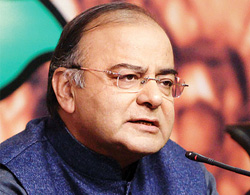Jammu, Dec 25: Asserting that it has several options, the BJP today said it will play a "crucial" role whoever forms the government in Jammu and Kashmir.
Addressing a press conference after a meeting of the newly-elected MLAs, Finance Minister and BJP's central observer Arun Jaitley said the legislators authorised party President Amit Shah to decide the future course of action on government formation.
"Whoever forms the government, BJP will have a crucial role to play in view of the fact that it has the highest popular vote in the elections.
"We will go (ahead on the issue of government formation) with three principles based on national and state interest. They are: strengthening of national sovereignty, development and regional balance," he said.
Without revealing the strategy, the Minister said the party was in touch with unattached members but described as inaccurate reports that it was in discussions with other party leaders in the state.
"Whether to wait and watch or be active, we will not talk about the strategy to the media," he said, adding there are no two opinions among the MLAs on the strategy to be adopted.
Explaining the highest popular mandate for the party, Jaitley said BJP won 25 out of the 76 seats it contested where as the other major parties contested all the 87 seats.
"Our votes is higher than those who have contested all the seats. Our strike rate is high. We have the highest popular vote. We have an overwhelming mandate in the Jammu region while the Valley has been divided between PDP (25 seats), National Conference (15) and independents (5)."
The MLAs discussed all issues including government formation in a hung House and who the leader should be in the new House and what role the party would be adopted.
There was a consensus that Government should be formed and which benches the party should occupy, he said.
Jaitley, who was deputed as central observer along with BJP National Secretary Arun Singh, flew in here this morning and met MLAs separately as well as collectively.





Comments
Add new comment